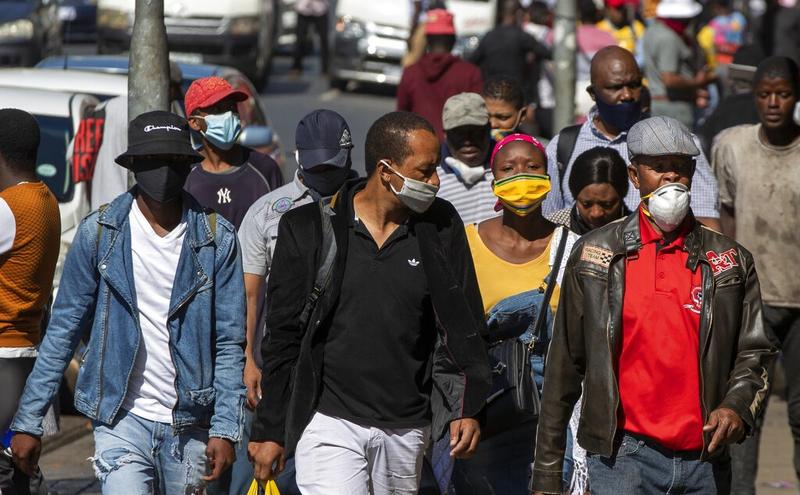 People wearing face masks to protect against the coronavirus walk on a street in downtown Johannesburg, South Africa, May 11, 2020. (THEMBA HADEBE / AP)
People wearing face masks to protect against the coronavirus walk on a street in downtown Johannesburg, South Africa, May 11, 2020. (THEMBA HADEBE / AP)
As African countries start to reopen their economies after strict lockdowns that were implemented in March due to the coronavirus pandemic, the United Nations Economic Commission for Africa, or ECA, is urging the continent to learn from the experience and experiments of other regions.
While the continent has much work to do in terms of putting in place the right systems to address the coronavirus pandemic, the ECA said that African countries had the advantage of currently being further behind other countries and regions in their infection trajectories.
African nations can use the 'extra time' afforded by the lockdowns to rapidly put in place testing, treatment systems, preventive measures, and carefully design lockdown exit strategies in collaboration with communities and vulnerable groups.
United Nations Economic Commission for Africa
"African nations can use the 'extra time' afforded by the lockdowns to rapidly put in place testing, treatment systems, preventive measures, and carefully design lockdown exit strategies in collaboration with communities and vulnerable groups," the UN agency said.
ALSO READ: Virus exposes gaping holes in Africa’s health systems
As of Monday, there were 66,373 confirmed cases across Africa, including 2,336 deaths, according to the Africa Centres for Disease Control and Prevention, or the Africa CDC.
In hard-hit South Africa, there were a total of 10,652 confirmed cases as of Monday and its death toll stood at 206, Health Minister Zweli Mkhize said.
To contain the spread of the virus, Mkhize said that the number of people attending funerals had to be limited to fewer than 50, as funerals have become a hot spot for infections.
Elsewhere in West Africa, schools in Benin reopened on Monday, with strict instructions on distance, hygiene and distribution of masks, after several weeks of closure. As of Tuesday, the country had reported 319 cases and two deaths, according to the Africa CDC.
At least 42 African countries have enforced partial or full lockdowns in their quest to curtail the pandemic. But South Africa, Botswana and Nigeria have started to steadily loosen their lockdowns.
Among the most sensitive issues facing policymakers is the impact of lockdowns on food security. The ECA estimated that a one-month full lockdown across Africa would cost the continent about 2.5 percent of its annual GDP, equivalent to about US$65.7 billion per month.
READ MORE: UN: Virus could kill 300,000 in Africa, even with interventions
In a report, "COVID-19 Lockdown Exit Strategies for Africa", published on Sunday, the ECA proposed exit strategies that have been tried around the world and outlined the risks involved for African countries.
Gradual exit
The strategies include testing, contact tracing, lockdown until preventive or curative medicines are developed, gradual segmented reopening, immunity permits, adaptive triggering and mitigation.
Under adaptive triggering, the ECA said nations could ease lockdowns once infections declined and reimpose them if they began to rise above intensive-care capacity.
The UN agency said an important consideration for many countries following the gradual segmented reopening strategy was the prioritization of economic sectors and the sequencing of their reopening.
It said no decision-maker knew the true spread of the virus within their country, hence any exit strategy bore considerable risk.
edithmutethya@chinadaily.com.cn


